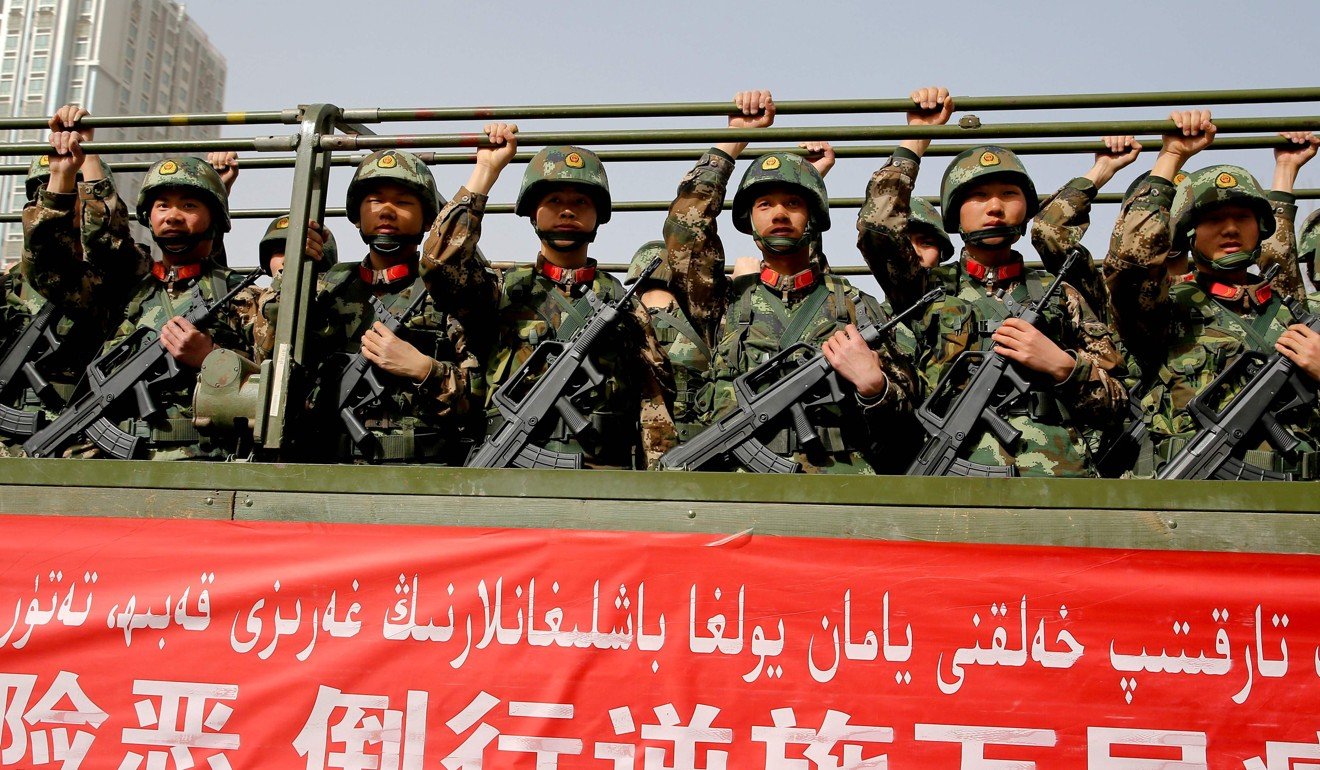
Rising tide of jihadists stopped trying to return to China, Chinese advisers say
Advisers claim 10-fold increase in border interceptions but do not offer absolute numbers
The number of “trained jihadist fighters” intercepted trying to re-enter China rose dramatically last year, posing a growing challenge for the country, according to Chinese government security and diplomatic advisers.
The sources did not specify total numbers but said the increase reflected a higher threat, particularly to China’s western region of Xinjiang.
But one London-based analyst said it was difficult to assess the extent of the threat without absolute figures.
Addressing an international relations forum in Beijing late last month, Ji Zhiye, head of the China Institutes of Contemporary International Relations, said China faced a “prominent” risk of a terror attack.
“The number of jihadists captured on China’s borders [in 2017] was more than 10-fold the number of the previous year,” Ji said.
He estimated that around 30,000 jihadists who had fought in Syria had left the war-torn country and returned to their home countries, including China.
Ji’s estimates were echoed by Li Shaoxian, director of the China-Arab Research Institute at Ningxia University. He told a forum at Renmin University on Saturday that Xinjiang was facing “severe” terrorist threats.
China has been on higher alert for terror attacks since the second half of 2015 when Islamic State expanded into Central Asia and Southeast Asia, including setting up bases in the Philippines and Indonesia.
“Terrorism is a global problem and cannot be eradicated over the short-run. Its threat to China is very real,” Li said. “There are many extremists with jihadist training returning to Xinjiang.”

In November, Syria’s ambassador to China Imad Moustapha said an estimated 5,000 Chinese militants, mostly Uygurs from Xinjiang, were believed to have been trained in Syria.
Beijing has blamed militants from the East Turkestan Islamic Movement for violent attacks in the western province.
But Uygur exile and human rights groups say the government’s intense security crackdown in Xinjiang, such as restrictions on Uygur language, culture and religion, has backfired, fuelling resentment and prompting more than 10,000 Uygurs to flee China.
Raffaello Pantucci, director of international security studies at the Royal United Services Institute in London, said it was difficult to fully assess whether the risk of terrorism facing China was significantly higher last year, saying the 10-fold increase may not be alarming in real numbers.
Pantucci said it was possible that China had seen a spike in returning jihadists, but added that the risk of going back to China was rising as Beijing stepped up its crackdown.
“I think certainly and globally, you see a shift in people [with jihadist training] going from the battlefield ... But whether these people are returning home is difficult to know,” he said.
China has ramped up security in Xinjiang since riots in the capital Urumqi in 2009.
In addition to anti-terror drills with Central Asian nations through the Shanghai Cooperation Organisation, China has also called on Turkey and Southeast Asian nations to crack down on extremists groups.
China and Turkey signed an extradition treaty last year when Turkish President Recep Tayyip Erdogan attended a forum in Beijing for the “Belt and Road Initiative”, China’s massive infrastructure and trade push to link up with Africa and Europe.
But Li said the cooperation between Beijing and Ankara was still limited.
China also intensified counterterrorism efforts with Southeast Asian countries. Thailand sent dozens of Uygurs back to China in 2015 and China has asked Indonesia to extradite Uygur terrorists.
China’s overseas projects such as the US$46 billion China-Pakistan Economic Corridor are also facing rising threats of terrorist attacks, observers have warned.
Fu Xiaoqiang, also from the China Institutes of Contemporary International Relations, said the focus of terrorism would shift from the Middle East to the Asia-Pacific and areas close to China, especially Afghanistan.
“This is a very dangerous trend,” he said, warning that the forces of extremism and terrorism were likely to be leveraged by countries keen to curtail China. “This is time-tested and well-tried strategy.”
He said worsening security in Afghanistan and Pakistan would affect conditions in Xinjiang in the coming years.
During the first meeting between foreign ministers of China, Pakistan and Afghanistan in late December, the three countries agreed to step up coordination in counterterrorism and pledged an “undiscriminating” crackdown on all terrorist groups and individuals.

